READING FROM THE OLD TESTAMENT: DEUTERONOMY 5-6:25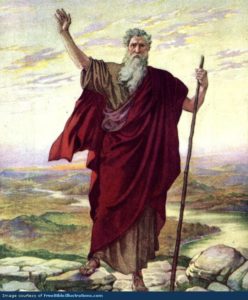
Moses begins his great address to the nation. He repeats the ten commandments that God gave them when He made a covenant with them at Mount Horeb (Sinai). This is the third record of the 10 Commandments in the Bible. (The previous records are found in Exodus Chapters 20 and 34).
Moses describes himself as standing in between God and the people at the time that the law was given (Deut 5:5). John the evangelist picks up on this picture of Moses when he contrasts Jesus with Moses as mediators in his gospel:
John 1:17 (NASB) 17 For the Law was given through Moses; grace and truth were realized through Jesus Christ.
The revelation of God’s righteousness was given on tables of stone to Moses who would communicate them to the people as holy demands. God’s holy demands are fulfilled on our behalf through Christ’s righteous living and His dying as the sacrificial substitute, the Lamb of God who takes away the sin of the world.
The Ten Commandments are repeated in Deuteronomy 5, verses 6-21. He reminds the people that they have witnessed God’s holiness at Mt. Sinai as an all-consuming fire (Deut 5:24-27). They have obligated themselves to the responsibilities of the Law by hearing, learning and doing all that He commanded.
God heard their resolutions but also said, “Oh that they had such a heart in them, that they would fear Me and keep all My commandments always, that it may be well with them and with their sons forever!” (Deut 5:29) This statement recognizes the unfaithful heart of the old man and anticipates the heart of obedience to be found in the new man. The unregenerate heart of man is likened to a heart of stone, incapable of hearing, learning or doing the will of God (Ezekiel 11:19-20; 36:26). The promise of the New Covenant is a heart that is alive, pumping with divine obedience, ready to hear, to learn and to do God’s will (the heart of Christ).
Then the Lord gives Moses a commission. We can see similarities and differences between this commission and the Great Commission given by Jesus to His disciples.
Moses is commissioned to say to the people- “Return to your tents.” Jesus tells us: “Go!”
Mark 16:15 And He said to them, “Go into all the world and preach the gospel to all creation.”
The Lord says to Moses: “Stand here by Me.” Moses is a type of the Law. The law stands subservient to Christ, the one who fulfills the Law. In the New Testament, Christ, the Law Giver, becomes the Law Interpreter and the Law Keeper.
Deuteronomy 5:31-33 (NASB) 31 ‘But as for you, stand here by Me, that I may speak to you all the commandments and the statutes and the judgments which you shall teach them, that they may observe them in the land which I give them to possess.’ 32 “So you shall observe to do just as the LORD your God has commanded you; you shall not turn aside to the right or to the left. 33 “You shall walk in all the way which the LORD your God has commanded you, that you may live and that it may be well with you, and that you may prolong your days in the land which you will possess.
Jesus said to his disciples:
Matthew 28:19-20 (NASB) 19 “Go therefore and make disciples of all the nations, baptizing them in the name of the Father and the Son and the Holy Spirit, 20 teaching them to observe all that I commanded you; and lo, I am with you always, even to the end of the age.”
In Deuteronomy 6, Moses reminds the people that their success in possessing their inheritance depends upon obedience. In the New Testament, the good news is that there is an inheritance laid up for us in heaven. Our possession of it is dependent upon the obedience of Another, the Lord Jesus Christ. Through His obedience, we have been “qualified to share in the inheritance of the saints in Light” (Colossians 1:12).
In Deuteronomy 6:4 we have the famous Hebrew statement of faith- The Shema.
Deuteronomy 6:4 (NASB) 4 “Hear, O Israel! The LORD is our God, the LORD is one!
The word for ‘one’ is ‘echad’ signifying a ‘composite unity’ and not the Hebrew word ‘yachid’ the word most commonly used for the singular ‘one’.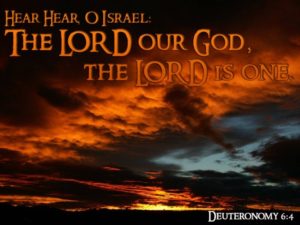
‘Echad’ is a relational word. It is found in Genesis 2:24
Genesis 2:24 (NASB) 24 For this reason a man shall leave his father and his mother, and be joined to his wife; and they shall become one (echad) flesh.
The word is found to describe one cluster of grapes (Numbers 13:23), three fighting units coming together as one man (Judges 6:16), or two sticks coming together to be one, signifying the northern and southern kingdoms becoming one (Ezekiel 37:16-17). In each of these cases there is a plurality in oneness. 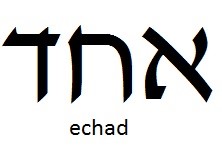
Ezekiel 37:16-17 (NASB) 16 “And you, son of man, take for yourself one stick and write on it, ‘For Judah and for the sons of Israel, his companions’; then take another stick and write on it, ‘For Joseph, the stick of Ephraim and all the house of Israel, his companions.’ 17 “Then join them for yourself one to another into one stick, that they may become one in your hand.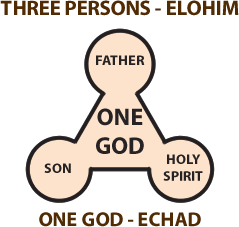
Upon the basis of God’s self-revelation as a community of oneness, specifically a Trinity (Father, Son and Holy Spirit), we can understand more clearly the New Testament declaration that “God is love”. The Scriptures don’t merely state that “God is loving”, but that “God is love”. Love is a relational word. God in Himself is relational. Love requires the Lover, Beloved, and the Love that exists between them.
The Great Commandment is based on this revelation. God is relational. Jesus explains, “A new commandment I give to you, that you love one another, even as I have loved you, that you also love one another. (John 13:34)
The relationship begins by our hearing what He says about Who He is and what He has done to demonstrate His love. (In the Old Testament these facts are reflected in the Law and the Tabernacle.)
Romans 10:17 (NASB) 17 So faith comes from hearing, and hearing by the word of Christ.
When we are introduced by faith to who God is (Love) and what He has done (so loved the world that He gave His only begotten Son so whoever believes in Him should not perish but have everlasting life) we will want to love Him back.
1 John 4:19 (NASB) 19 We love, because He first loved us.
Deuteronomy 6:5 (NASB) 5 “You shall love the LORD your God with all your heart and with all your soul and with all your might.
Jesus turns the words of command into words of promise.
When we put our faith in Christ, we receive the Holy Spirit who sheds His love abroad in our hearts. In ourselves, we fail to love God as we should. But God’s love never fails.
We must let the Word of God impress us deeply if we are to impress others with it.
Deuteronomy 6:6 (NASB) 6 “These words, which I am commanding you today, shall be on your heart.
Deuteronomy 6:7 (NASB) 7 “You shall teach them diligently to your sons and shall talk of them when you sit in your house and when you walk by the way and when you lie down and when you rise up.
The word ‘teach’ (shaman in the Hebrew) means ‘to sharpen’. Not only are we to hear God’s Word and meditate upon it until it makes a deep impression upon us, but we are told to sharpen it, prepare it like an arrowhead, so that it can penetrate the heart of those we are teaching. This will include visual aids (the frontlets between your eyes- being diligent to keep them in view), reflecting its truths in the things around you (the posts and gates of your house). We are to help others to hear, read, study, memorize and meditate upon the Word of God.
After the children of Israel returned from Babylon, the Israelites had portions of Scriptures rolled up in a black calfskin pouch attached to their person with four strips of parchment put into four little cells within a square case called a phylactery.
This passage reminds us again of the importance of hearing, learning, doing AND teaching the Word of God. The next generation will only be impressed with the Word of God if we are prepared to do all four.
We are to communicate the truth about God’s character and His work of redemption. We are also to give our children a vision for their future. The reason they were redeemed is so they can possess what God has promised of a hope and a certain future.
Deuteronomy 6:23-24 (NASB) 23 He brought us out from there in order to bring us in, to give us the land which He had sworn to our fathers.’ 24 “So the LORD commanded us to observe all these statutes, to fear the LORD our God for our good always and for our survival, as it is today.
READING FROM THE NEW TESTAMENT: Luke 7:11-25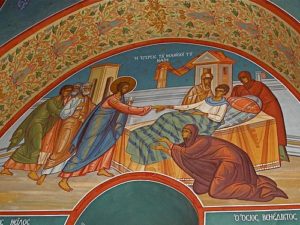
When Jesus approached the village of Nain, He saw a funeral procession coming out of the village gate. He saw a grieving widow who had lost her only son. His heart overflowed with compassion.
There is no mention of names in this incident, just “widow”, “only son”, and “young man”. Jesus, moved with compassion, spoke his command to the dead son, “Young man, arise!”
And then we read the resolution, “And Jesus gave him back to his mother.” What a wonderful foretaste of what Jesus does through His redemptive and restorative work of reconciliation!
John the Baptist struggles with doubt. He once had the inner assurance that Jesus was the Messiah. But his current circumstances must have been baffling. Why was he still in prison? He had been locked up for months (Luke 3:19-20). Could not Jesus rescue him if He were the Messiah? If Jesus came to set the captives free, why was he still a prisoner? Why were his prayers not being answered? Why had Herod not yet repented?
John is a man with passions and questions like the rest of us. He was tempted to quit, like Moses (Numbers 11:10-13), Elijah (1 Kings 19), or Jeremiah (Jeremiah 20:7-9, 14-18).
John had heard from God that Jesus was the Messiah and had previously born public witness to this fact:
John 1:32-34 (NASB) 32 John testified saying, “I have seen the Spirit descending as a dove out of heaven, and He remained upon Him. 33 “I did not recognize Him, but He who sent me to baptize in water said to me, ‘He upon whom you see the Spirit descending and remaining upon Him, this is the One who baptizes in the Holy Spirit.’ 34 “I myself have seen, and have testified that this is the Son of God.”
But John the Baptist was in what must have been to him an equivalent to the pilgrim’s “Dungeon of Despair” in Castle Doubting described in John Bunyan’s “The Pilgrim’s Progress”. 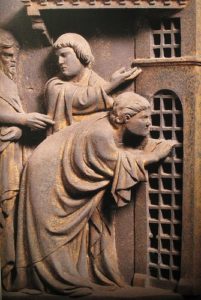
John sends his disciples to inquire if Jesus actually is the Messiah. When John the Baptist adds the statement “or do we look for someone else?” he is making a public challenge to Jesus to prove His Messiahship.
This is a temptation that Jesus had previously faced in the wilderness- “If you are the Son of God- prove yourself.”
Jesus responded in a similar manner. With the Word. Jesus sends back the report that the Messianic prophecies are being fulfilled in the miracles that are taking place. He refers to the prophecies of Isaiah.
Isaiah 35:5 (NASB) 5 Then the eyes of the blind will be opened and the ears of the deaf will be unstopped.
Isaiah 61:1-3 (NASB) 1 The Spirit of the Lord GOD is upon me, Because the LORD has anointed me To bring good news to the afflicted; He has sent me to bind up the brokenhearted, To proclaim liberty to captives And freedom to prisoners; 2 To proclaim the favorable year of the LORD And the day of vengeance of our God; To comfort all who mourn, 3 To grant those who mourn in Zion, Giving them a garland instead of ashes, The oil of gladness instead of mourning, The mantle of praise instead of a spirit of fainting. So they will be called oaks of righteousness, The planting of the LORD, that He may be glorified.
Jesus emphasized that He did not want anyone to fall away on account of His timing of the Messianic kingdom. That was in God’s hands. Trust in the Word and its promise.
Luke 7:23 (NASB) 23 “Blessed is he who does not take offense at Me.”
The word ‘offense’ is the Greek word from which we get the English word ‘scandalized’. It refers to a bait stick, or falling into a trap. Don’t be trapped by being occupied with what Jesus is not doing. Instead focus on what He IS doing.
After John’s disciples depart, Jesus speaks to the crowd teaching them that John the Baptist is the fulfillment of the prophecy in Malachi 3:1 and thereby infers that He is the Messiah, the predicted “Coming One”.
Malachi 3:1 (NASB) 1 “Behold, I am going to send My messenger, and he will clear the way before Me. And the Lord, whom you seek, will suddenly come to His temple; and the messenger of the covenant, in whom you delight, behold, He is coming,” says the LORD of hosts.
John is also the one spoken of in Isaiah 40:3.
3 A voice is calling, “Clear the way for the LORD in the wilderness; Make smooth in the desert a highway for our God”.
Jesus then makes a baffling statement: John is the greatest of all who have ever lived, implying the greatest of the prophets, yet the least in the Kingdom of God is greater than he is.
Jesus is referring to a new kind of humanity that will be born out of the cross. The Adamic heritage will pass away and those who are born again of the Holy Spirit will be partakers of His divine nature. John was a herald of the kingdom. Believers today are children of the kingdom.
READING FROM PSALMS: Psalm 68:19-35
Praise be to God! He is the source of the life of His people (verse 26).
This Psalm celebrates the march of God with His people throughout the ages. We can be assured that He will ultimately lead His people to victory. He is a God who saves and who rescues us from death (v.20). He ensures that the enemy is defeated.
There is the great prayer request in verse 28: “Summon Your might, O God. Display your power, O God, as you have in the past.”
Music permeates the victory procession. The singers are in front, musicians behind, and the women with tambourines in between. So, the songs of praise should accompany us on our present march to victory!
READING FROM PROVERBS: Proverbs 11:29-31
Proverbs 11:29-31 (NASB) 29 He who troubles his own house will inherit wind, and the foolish will be servant to the wise-hearted. 30 The fruit of the righteous is a tree of life, and he who is wise wins souls. 31 If the righteous will be rewarded in the earth, How much more the wicked and the sinner!
What is gained if we do not heed God’s wisdom? An inheritance of the wind (nothing). The fools who lean on their own understanding will discover that those who trusted the Word of the Lord are advancing in what is truly valuable and non-perishable. Being right with God through faith in the gospel brings the nourishment of deathless life to others. It is wise to be invested in sharing this good news of how sinners can be put in a right relationship with God through faith in the person and work of Christ.
PRAYING FOR THE NATIONS:
(Using the Prayer Guide “OPERATION WORLD”)
We are praying for Cameroon.
Evangelicals, especially Pentecostals, have grown rapidly in the last 20 years, having had a late start due to the hostility of older denominations. A number of these groups have been started by other African evangelists- in particular by Nigerians, rather than by Westerners.
Pray for:
- Greater spiritual unity and cooperation
- More effective discipleship in the churches.
- Pastors and leaders of great integrity and spirituality. Many of these churches lack accountability structures, and their leaders are often accused of being charlatans seeking wealth by manipulating the faithful. Pray that those with pure motives and hearts may see their churches grow, while the wolves in sheep’s clothing may be exposed as fakes.
- Biblical engagement across all spheres of society. The newer churches deliberately avoid being involved in issues of politics, justice, education, etc. concentrating solely on spiritual and material blessings for their members. Pray for the maturation of these groups such that they might have a holistic vision and profound impact on the nation.
- Pray for training programs that will introduce the Bible to Christians. For many, the pastor’s sermon is the extent of their interaction with the Scriptures. There are increasing numbers of modular-training programs, aimed at poorer, bi-vocational pastors and church members. Pray also for the two Christian universities that aim to provide quality academic education within the framework of a Christian worldview.
PRAYER: We are grateful, O God, for your self-revelation through the Scriptures. It is a privilege to have Your Word and a privilege to share it with others. You, Father, Son and Holy Spirit are Love. We are thankful for demonstrating Your love. In Love You gave the Law and in Love You fulfilled the Law on our behalf. While we were sinners, Christ died for us. We praise You for raising Him to life. Now the law of the Spirit of Life in Christ Jesus liberates us to love others as You have loved us! You have brought us, like the widow’s son, from death to life! You have granted our internal struggles and doubts the indisputable evidence of fulfilled prophecy, including the empty Tomb. Forgive us, O Lord, for our failures to trust You. You are to us a God of deliverances (Psalm 68:20). We look to You, our strength, our power, our redeemer, our friend, and the Joy of Your people! May we testify of Your faithfulness! In Jesus Name. Amen
Pastor David MacAdam
New Life Community Church, Concord
